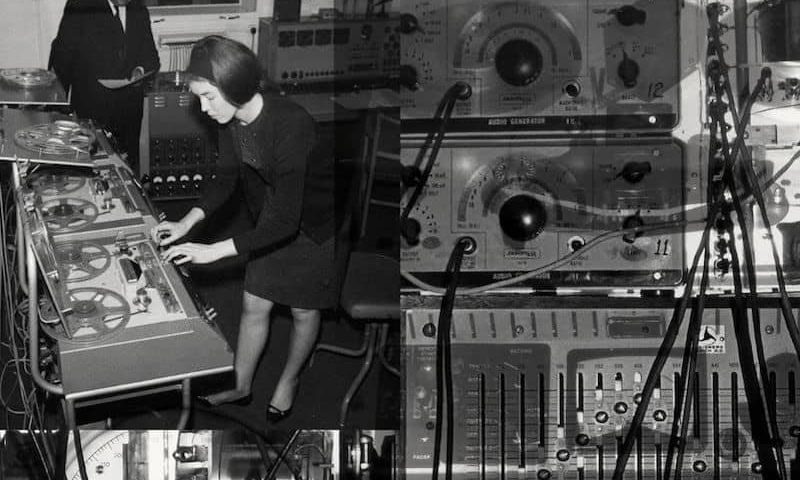The Groundbreaking Sound of Delia Derbyshire
If you don’t know who Delia Derbyshire is, you should. Here’s a primer on the unsung heroine of British electronic music.

Welcome to The Queue — your daily distraction of curated video content sourced from across the web. Today, we’re watching a video that explores the groundbreaking work of Delia Derbyshire.
If you’ve ever wondered how early electronic musicians worked in a time before computers and synthesizers, the answer is: very laboriously.
In the 1960s, composing electronic music the analog way meant working with magnetic tape, which is a cumbersome, finicky medium that demands time, exactness, and perfectionism. The innovation of magnetic tape was that it allowed artists to manipulate natural and found sound once it had been recorded.
In this way, early electronic composers, like Delia Derbyshire, weren’t all that dissimilar from foley artists. As with foley, it was ultimately the job of these pioneers to hear the potential in a breath of wind, to envision the musicality of the neck of a wine bottle, or to hear the rhythm of the sound of clogs on cobblestone. The result: a process that was at once organic and alien, a distinctly human-made noise that was also implacably not of this earth.
Derbyshire, a working-class genius and Cambridge-educated mathematician, was particularly gifted when it came to hearing a sound and knowing what to do to make it interesting. The bulk of Derbyshire’s musical output came from her tenure at the Radiophonic Workshop, a sound effects unit of the BBC — housed on top of a skating rink — created in 1958 to produce incidental sounds and new music for radio and, later, television.
As it were: there was a need for a pioneering approach to sound to complement the pioneering approach to programming in the 1960s. During her eleven years at the Workshop, Derbyshire would create music and sound for almost two-hundred radio and television programs, including the hauntingly iconic theme song for Doctor Who.
Because the BBC preferred to keep the members of the Workshop anonymous, Derbyshire’s genius was not recognized, as it should have been, at the time of her creative output. She was never credited as a composer and never saw financial residuals for her work. And yet, despite the best efforts of the BBC bureaucracy, the forces of time now rightfully recognize Derbyshire’s pioneering genius as an early and invaluable contribution to electronic music.
Below, you can find a clip showcasing an inside look into the Workshop, with reflections on how the Workshop brought composer Ron Grainer‘s Doctor Who theme to life.
Watch “Creating the Theme | Radiophonic Workshop | Doctor Who“:
Who made this?
This clip above is from the special feature “Masters of Sound” on the Doctor Who: The Beginning box set DVD.
More Videos Like This
- The first time I personally heard Delia Derbyshire’s work was on the soundtrack for the marvelously creepy The Legend of Hell House. Derbyshire left the BBC in 1973 and briefly worked at Hodgson’s Electrophon studio, where she found time to contribute to the film’s soundtrack. Check out its ooky-spooky theme song.
- Here is the trailer for the 2009 documentary The Delian Mode, directed by Kara Blake. The short Canadian documentary premiered at the Hot Docs Canadian International Documentary Festival and offers a cursory profile of Derbyshire. It won the award for Best Short Documentary there and went on to win a Genie Award in the same category. You can buy the doc on DVD via the film’s website.
- Derbyshire was celebrated on an episode of the children’s program Absolute Genius.
- Suzanne Ciani is another under-praised pioneer of electronic music. Here she is explaining the basics of synthesizers. In addition to being a technical and musical genius, Ciani has the most soothing voice in the world — it’ll clear your skin and fix your credit score; it’s absolute magic.
- Laurie Spiegel worked in computer graphics (she was a VFX artist on Wim Wenders’ The State of Things) but she is known primarily for her electronic music compositions. Here’s my favorite piece of her’s, created with the GROOVE system at Bell Labs.
